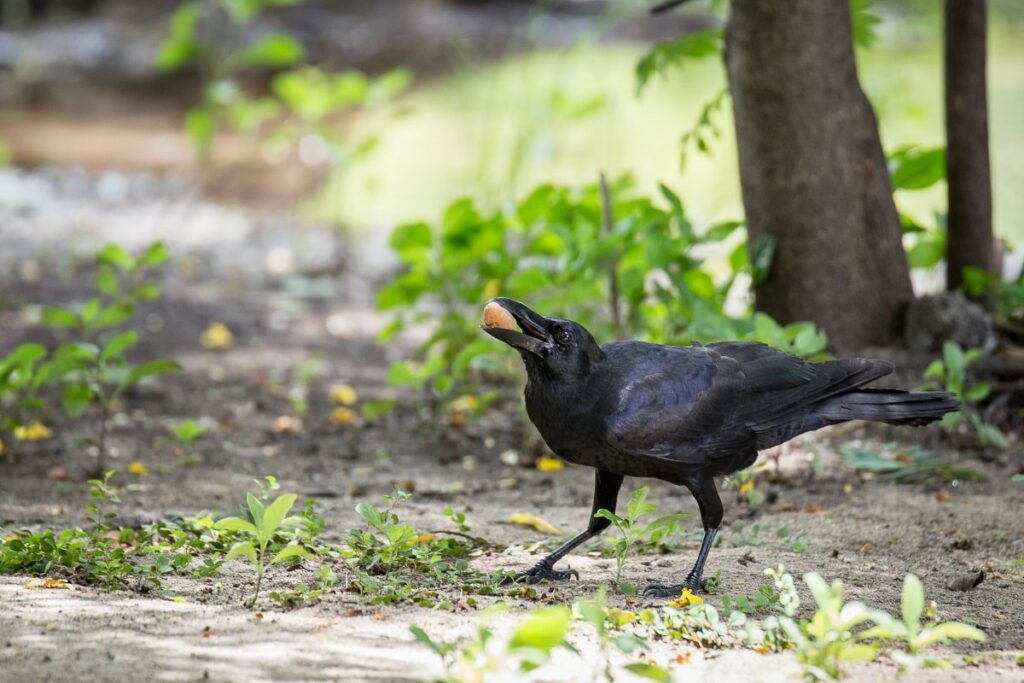Crows are clever birds that live in many habitats worldwide. These birds are in the Corvidae family and usually have large bodies and shiny, black feathers. These black crows often exhibit strange social behaviors, and people often associate them with superstitions.
Wild, black crows are omnivorous and will eat anything, including dead animals, garbage, birdseed, snails, insects, spiders, eggs, baby birds, and small animals. These opportunistic birds are highly adaptable and have thrived in human-disturbed habitats.
In addition, crows are intelligent and can use tools or problem-solving to acquire food. For example, some crows learned to drop nuts with hard shells on the road and let cars drive over them to crack them open.
The crows that live along coastlines have learned that they can pluck mollusks with hard shells out of the water and drop them onto rocks to crack them open and reach the animal inside. This cleverness enables them to access food unavailable to many other animals.
People sometimes treat wild crows as pests because they can be noisy and destructive to their houses and gardens. However, wild crows play an essential role in the ecosystem by eating many rodents and carrion.

What Do Crows Eat During Winter?
Cold winter weather challenges animals who do not migrate to warmer climates. Finding food can be difficult when snow and ice cover the ground. Crows often travel in flocks during winter to increase their chances of finding food.
Crows will eat anything during the winter, including carrion, insects, seeds, nuts, berries, and small animals. They often scavenge for food in garbage cans, dumpsters, and birdfeeders when other food sources are unavailable and may store extra food to eat later.
Although the ability and willingness of crows to eat whatever is available ensure their winter survival, young crows sometimes starve because they haven’t learned how to problem-solve in some situations to access necessary food sources.
What Do Baby Crows Eat?
Crows live in family groups containing both parents and offspring from previous years. During the breeding season, the mother incubates the eggs and remains with the nestlings while the father and the older offspring help by foraging for food to feed the mother and the new babies.
The father and older siblings feed the baby crows by consuming food and carrying it back to the nest, where they regurgitate it for the babies. Multiple crows can often be seen around a nest, feeding the babies with foods such as insects, worms, small mammals, reptiles, and fruits.
As the baby crows get older, they start to forage more on their own, and older siblings and parents often continue to supplement that foraging by feeding the babies for up to a month after they fledge.
How Much Do Crows Eat in a Day?
Depending on availability, crows can eat a lot of food in a day relative to their body size, sometimes as much as half their body weight. These opportunistic birds are always searching for their next meal and will eat what they can when they find food and store the extra for later.
Crows are intelligent and curious and quickly learn to associate people with food. When people leave food outside or feed crows directly, the crows will congregate in these areas. While crows do become friendly with humans, this friendship can lead to conflicts with other humans.
Flocks of crows can be noisy, they can damage property by ripping open garbage bags, they can damage things by pecking at them, and they steal shiny objects that are small enough to be carried away. Most states established a hunting season for crows to help control the population.
How Can I Attract Crows?
Despite the damage that crows can cause and the nuisance that flocks can be, many people enjoy interacting with crows and want to attract them to their homes. Crows learn quickly where consistent food sources are located and quickly become accustomed to visiting those sources.
People that want to attract crows to their homes should leave a variety of foods outside, available to any passing crows. If foods like fruit, nuts, and seeds are left out consistently, crows will visit almost daily to check and eat what is available.
Other ways to encourage crows to visit and stay awhile include providing clean water and giving crows a place to build a nest and roost at night. Crows can recognize humans and will learn to associate specific humans with food and safety.
Over time, people can build a friendly relationship with individual crows once trust has been established. Crows can even learn to perform tricks if a food reward is associated with a specific set of actions.
What Should You Not Feed Crows?
Wild crows will eat anything they can find, including animals, vegetables, fruits, trash, dead animals, insects, seeds, and grain. Unfortunately, crows do not always avoid eating items that can make them sick, and they sometimes ingest foods that can be toxic or harmful.
Many wild crows interact with humans and may eventually act like pets, although people should always remember that they are still wild animals. People who befriend crows should learn which human foods crows should avoid eating.
People who want to attract crows or befriend them should avoid feeding any foods that can be toxic, including chocolate, avocado, onions, garlic, salty or sugary food, apple seeds, fruit pits, and caffeine.
